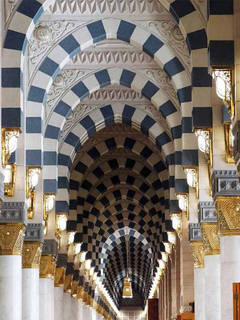
After decades of efforts and dialogue among more than 150 Muslim and non-Muslim experts to reflect the diversity of the Islamic world, UNESCO's large collection on "The Different Aspects of Islamic Culture" has just been completed. Launched in 1977, it is a practical tool for intercultural and interreligious dialogue. It offers all those interested with a large amount of knowledge on Islam and its contribution to the world from a pluralistic and global perspective. A special event was organized to celebrate this occasion on 17 November 2016 at UNESCO Headquarters in Paris.
Irina Bokova, Director-General of UNESCO, Seddig Nasser, Delegate of the World Islamic Call Society (WICS), who contributed financially to the project, as well as Salima Dalibey and Somia Djacta, representatives respectively of the Organization of Islamic Cooperation (OIC) and the Islamic Educational, Scientific and Cultural Organization (ISESCO), participated in this official ceremony.
At a time when Islam is at the core of a debate, not only theological and cultural but also geopolitical and ideological, the completion of this collection acquires a new meaning. The six volumes address many of the issues raised in this global debate, such as the foundations of faith and the message of Islam, the place of the individual in Muslim society, the development of science and technology in Islam, educational approaches, cultural, artistic and spiritual expressions of Islam and, finally, the new practices and creations of Muslim populations in the world today.
In her speech, Irina Bokova stressed that "this work resonates at the heart of UNESCO's mandate to build (...) bridges between peoples (...) by knowledge sharing, by mutual understanding, and that this ambition has never been more vital than today to provide tools, benchmarks and knowledge that help people and cultures to get to know each other better, to understand each other better and to thwart lies, amalgams and prejudices that rely on ignorance and fuel the logic of withdrawal and hatred."
Seddig Nasser congratulated UNESCO on its successful completion of this difficult scientific and intellectual initiative. He reiterated the wish of his organization to sign a new agreement with UNESCO to continue this cooperation and ensure the translation of the entire collection into Arabic and French. He recalled the need to make the contents of the volumes available to the general public in digital form, through a dedicated website and the production of multimedia materials.
A debate on "Islam and Islamic culture in the world today" followed the ceremony, led by Mahmoud Hussein – common pseudonym of Bahgat El Nadi and Adel Rifaat, philosophers and political scientists, authors of several reference books on the birth of Islam – and Khaltoum Saafi, sociologist and Islam expert.
Mahmoud Hussein addressed the question of Muslim humanism and recalled that it has generally been developed within religious thought and not against it. They analyzed the way in which Muslim philosophers (Mu'tazilites and Falasifa) exercised their free will to develop a body of knowledge that was later widely exploited by European thinkers.
Khaltoum Saafi stressed the need to reconnect with the interpretative effort (Ijtihad) that allowed Islam to adapt to different cultural contexts.
The debate with the public, moderated by Ghaleb Bencheikh – producer of the radio show "Cultures de l'Islam" (Cultures of Islam - France Culture) and animator of the television show "Islam" (France 2) – demonstrated the need to offer spaces for dialogue on these essential and more than ever topical issues.
"The Different Aspects of Islamic Culture" is the latest collection of UNESCO's General and Regional Histories Project, a project that introduces another way of writing the history of populations by decompartmentalizing historical narratives and by putting an emphasis on the values and links between populations on a regional and global scale.

Add new comment